11 Home Remedies To Get Rid Of Helicobacter Pylori Infection
Simple and natural ways for you to treat a bacterial infection affecting your digestive tract.

Image: Shutterstock
A feeling of gassiness accompanied by nausea, bloating, and unexplained weight loss may indicate Helicobacter pylori infection. About 44.3% of the population around the world is affected by this microbe (1). Natural treatment of Helicobacter pylori mostly includes using ingredients with medicinal value to minimize the infection. In this article, you will know about Helicobacter pylori infection and how to manage it effectively with simple home remedies. Continue reading further.

In This Article
What Is H.pylori?
Helicobacter pylori or H. pylori are bacteria that can enter your body and thrive in your digestive tract. After years, they can surface as sores in the lining of your stomach or the upper part of your small intestine. This infection may also lead to stomach cancer in some individuals.
 Did You Know?
Did You Know?H. pylori infections are quite common. These bacteria are found in the bodies of two-thirds of the world’s population. However, they do not cause symptoms in most people. Possible symptoms are discussed in the next section.
A study showed that H. pylori affects up to 50% of the world’s population. Its prevalence varies across the world, with the United States having a 5% prevalence in children under the age of ten. When compared to White Americans, Hispanic and African American groups have a higher prevalence.
Key Takeaways
- Helicobacter pylori are bacteria that can infect your stomach and small intestine.
- They are found in around two-thirds of the world population.
- They may cause bloating, nausea, vomiting, burping, loss of weight, and loss of huger.
- In serious cases, they may also lead to stomach cancer.
Signs And Symptoms
Stomach ulcers are one of the most prominent symptoms of an H. pylori infection. The other symptoms are mostly associated with ulcers. They may include:
- Bloating
- Nausea
- Vomiting
- Burping
- Loss of hunger
- Weight loss
- Stress and anxiety
In some cases, the ulcers can bleed into the stomach or intestines. This could be dangerous to your health. The symptoms of bleeding ulcers may include:
- Bloody stool that may be dark red or black
- Difficulty in breathing
- Fainting or dizziness
- Fatigue
- Pale skin
- Vomit that may have some blood in it
- Severe stomach ache
Home remedies for ulcers can offer symptomatic relief. Incorporating foods with natural healing properties, such as honey and licorice root, can aid in the healing process and reduce discomfort associated with ulcers.
While it is not common, some H. pylori infections can lead to the development of stomach cancer. This may cause a few symptoms like heartburn. Eventually, you may also notice other signs like:
- Nausea
- Loss of appetite
- Belly pain and/or swelling
- Vomiting
- Weight loss without any apparent reason
- Feeling full after eating a small amount
Stomach ulcers were initially thought to be a result of smoking and consuming spicy foods. It was later that researchers found H. pylori to be the main culprit behind the development of such ulcers.
Ellie, a blogger, talks about her journey with H. pylori that started in 2016. She writes, “I became ill for 24 hours- constant vomiting and fever. I couldn’t keep fluid down. It felt like I threw up every ounce of liquid in my body (i).” She adds that over the next few months, she experienced her stomach reacting to foods that it never did before. Finally, her doctor suggested testing for H. pylori and she was diagnosed with the infection.
Let’s look into the causes and risk factors.
Causes And Risk Factors
What causes an H. pylori infection to spread from one person to another is still not known. While these bacteria have coexisted with humans for many years, the infection was found to spread from one person’s mouth to another. It may also spread from feces to the mouth. Infected individuals who do not wash their hands after using the loo can spread the infection to others through food and water they may have touched.
Once ingested, H. pylori can penetrate the mucus lining of the stomach, generating substances that neutralize the stomach acids. As a result, the stomach cells become increasingly vulnerable to the harsh acids. The irritation of the stomach lining due to H. pylori and the stomach acids cause ulcers in the stomach as well as the duodenumi The first part of the small intestine, right below the stomach, which receives food and absorbs nutrients from it. .
Factors that can increase your risk of developing an H. pylori infection are:
- Living in or visiting a developing country
- Sharing utensils with an affected individual
- No or less access to hot water
- Non-Hispanici Someone who is neither Cuban, Mexican, Puerto Rican, South or Central American, nor is connected to any Latin-speaking nations. African or Mexican American descent
- Poor hygiene practices
- Mouth-to-mouth contact
- Sexual intercourse with an affected individual
As you can see, H. pylori infections can be transmitted from one person to another in a number of ways. There are many combinations of antibiotics and other medications available to eliminate the bacteria while reducing ulcers.
Listed below are some natural remedies and alternative medicines that can assist these medications in treating an H. pylori infection.
Natural Remedies To Get Rid Of H. pylori Infection
There are many natural remedies that you can use in mild cases of H. pylori infection. However, note that while these natural remedies may help manage the infections by supporting digestion and reducing inflammation, they should not be considered a substitute for medical treatment. The effectiveness of these remedies varies, and they may not fully eliminate the bacteria or prevent complications like ulcers. Also, some ingredients may interact with medications or cause side effects. So, consult a healthcare provider before trying any new treatment, especially if you have pre-existing conditions or are on prescribed antibiotics. A proper diagnosis and medical guidance ensure the safest and most effective approach to managing H. pylori infections.
Now, let us explore some at-home methods that may soothe H. pylori infections.
- Probiotics
- Green Tea
- Honey
- Olive Oil
- Aloe Vera
- Licorice Root
- Black Seed (Nigella Sativa)
- Turmeric
- Ginger
- Oil Pulling With Coconut Oil
- Lemongrass Oil
1. Probiotics

You Will Need
Probiotic supplements
What You Have To Do
- Consume probiotic supplements along with prescription medications daily.
- You may also consume natural sources of probiotics like yogurt or kefiri A sour drink made from fermented milk using cultures of yeast, bacteria, and some other microorganisms. .
How Often You Should Do This
You can take this daily after consulting your doctor.
Why This Works
Probiotics can act as an adjuvant treatment in reducing the side effects of antibiotics taken to treat H. pylori infections (2).
2. Green Tea

You Will Need
- 1 teaspoon of green tea
- 1 cup of hot water
What You Have To Do
- Add a teaspoon of green tea to a cup of hot water.
- Steep for 5-10 minutes and strain.
- Drink it.
How Often You Should Do This
You can drink green tea two times daily.
Why This Works
A study published in the International Journal of Antimicrobial Agents explored the effects of green tea on Helicobacter infections, a major risk factor for gastric cancer. Researchers found that green tea compounds inhibited the growth of Helicobacter species, both in lab tests and in animal models. The study also showed that drinking green tea could prevent gastric inflammation, highlighting its potential role in gastritis prevention and treatment (3). Hence, regular consumption of green tea may help in the prevention as well as treatment of H. pylori infections.
3. Honey

You Will Need
1-2 teaspoons of raw honey
What You Have To Do
- Add one to two teaspoons of raw honey to your tea or juice.
- You can also consume raw honey directly.
How Often You Should Do This
Do this 1-2 times daily.
Why This Works
The antimicrobial properties of honey can be used to treat H. pylori infection. It may also reduce the recovery time when used as an adjuvant therapy with prescription medications. A study published in Sultan Qaboos University Medical Journal examined the antibacterial activity of honey against Helicobacter pylori and its potential synergy with amoxicillin and clarithromycin (bacterial antibiotics), which are commonly used to treat H. pylori infections. Researchers tested eight commercial honey samples from Muscat and found that all exhibited antibacterial effects. While honey did not enhance or interfere with the effects of these antibiotics, the study suggests that incorporating honey into triple therapy regimens may help accelerate H. pylori eradication in patients with gastritis or duodenal (relating to the first part of the intestine) ulcers (4).
4. Olive Oil

You Will Need
1 tablespoon of virgin olive oil
What You Have To Do
Add a tablespoon of virgin olive oil to your favorite dishes and salads.
How Often You Should Do This
You can do this 1-2 times daily.
Why This Works
Olive oil polyphenols exhibit bactericidal activities that can help in getting rid of antibiotic-resistant strains of Helicobacter pylori. A study published in the Journal of Agricultural and Food Chemistry highlights the antibacterial activity of olive oil polyphenols against H. pylori. Researchers demonstrated that phenolic compounds from virgin olive oil can diffuse into the gastric juice and remain stable in its acidic environment. In in vitro tests, these compounds exhibited strong bactericidal effects against eight strains of H. pylori, including antibiotic-resistant strains (5).
5. Aloe Vera
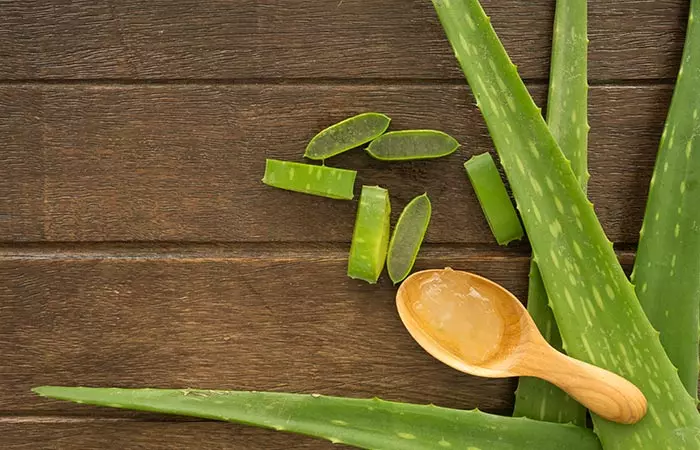
You Will Need
- 1 aloe vera leaf
- 1 cup of water
- Any juice (optional)
What You Have To Do
- Take an aloe vera leaf and scrape out the gel using a spoon.
- Blend the gel with a cup of water.
- You can also add any fruit juice or honey to the mixture for added flavor.
- Drink the juice.
How Often You Should Do This
Drink this aloe vera juice once daily or every alternate day for a couple of weeks.
Why This Works
Aloe vera gel exhibits antimicrobial effects against H. pylori. It may also work well as adjuvant therapy in combination with other antibiotics (6).
6. Licorice Root
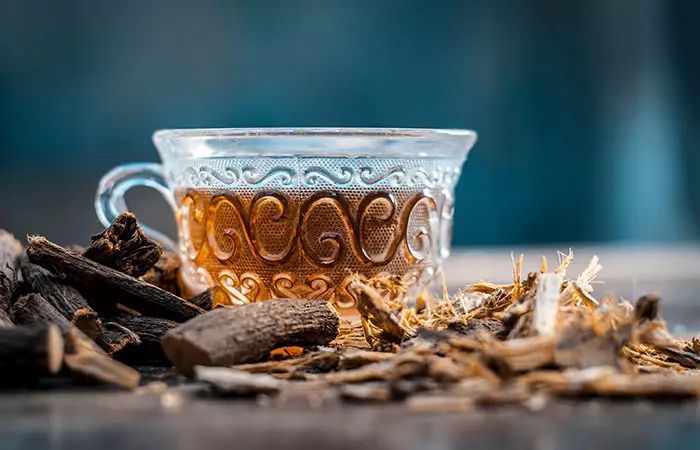
You Will Need
- 1-2 teaspoons of licorice root
- 1 cup of water
What You Have To Do
- Add one to two teaspoons of licorice root to a cup of water.
- Bring it to a boil in a saucepan.
- Simmer and strain. Allow it to cool.
- Drink it up.
How Often You Should Do This
Drink this 1-2 times daily for best results.
Why This Works
Licorice possesses anti-H. pylori effects that can help treat and prevent the infection (7).
 Quick Tip
Quick Tip7. Black Seeds (Nigella Sativa)
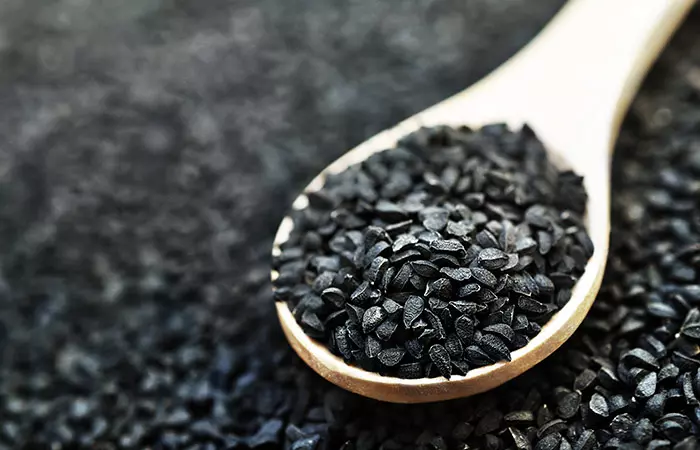
You Will Need
- 1 teaspoon of ground black seeds
- 2 teaspoons of raw honey
What You Have To Do
- Combine a teaspoon of ground black seeds with two teaspoons of honey.
- Consume the mixture.
How Often You Should Do This
You can consume this mixture once daily until your symptoms improve.
Why This Works
A mixture of black seeds (Nigella sativa) and honey exhibits anti-H. pylori and anti-dyspeptici A drug type that can help relieve symptoms of dyspepsia (or indigestion) and several other digestive issues. effects that can help in the eradication of H. pylori infection (8).
8. Turmeric
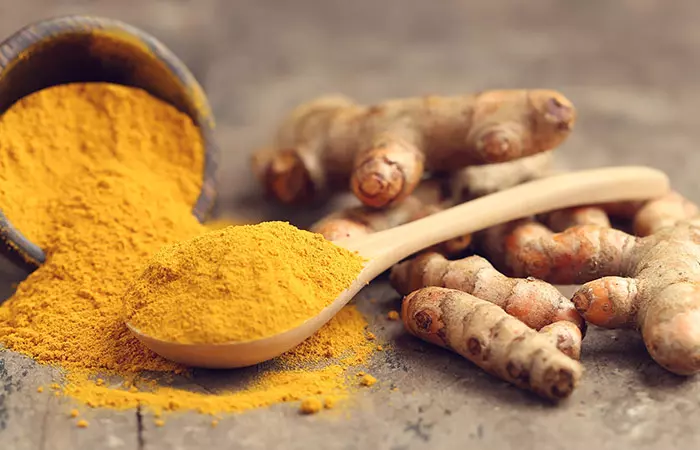
You Will Need
- 1 teaspoon of turmeric powder
- 1 glass of hot milk
What You Have To Do
- Add a teaspoon of turmeric powder to a glass of hot milk.
- Mix well and drink it.
- You can also take supplements for curcumin after consulting your doctor.
How Often You Should Do This
Do this once daily for at least a week.
Why This Works
The major component of turmeric is curcumin. Curcumin possesses anti-H. pylori and immunomodulatoryi A property or drug with the ability to increase or decrease immune response to help fight chronic conditions like cancer or AIDS. properties that may help in treating H. pylori infections (9).
9. Ginger
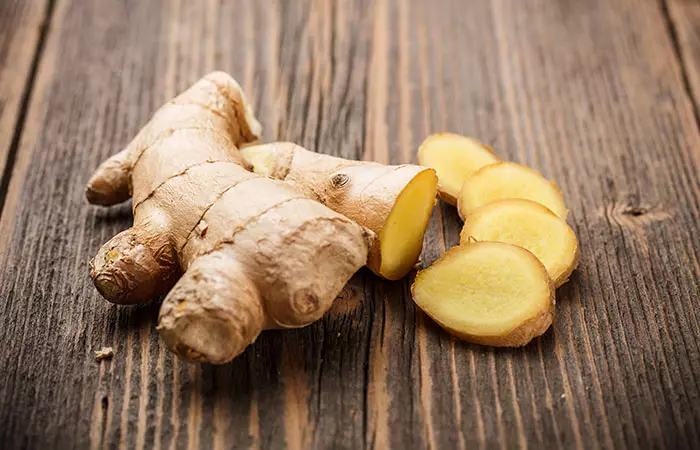
You Will Need
- 1 inch of sliced ginger
- 1 cup of water
What You Have To Do
- Add an inch of sliced ginger to a cup of water.
- Bring it to a boil in a saucepan and simmer for 5 minutes.
- Strain and allow the ginger water to cool down for a while.
- Drink the mixture.
- You can also add ginger to your favorite dishes or chew on it directly.
How Often You Should Do This
Consume this mixture 1-2 times daily.
Why This Works
Ginger contains phenolic compounds called gingerols that exhibit anti-H. pylori effects. Daily consumption of ginger may help inhibit the growth of H. pylori, especially the Cag A+ strains (10).
10. Oil Pulling With Coconut Oil
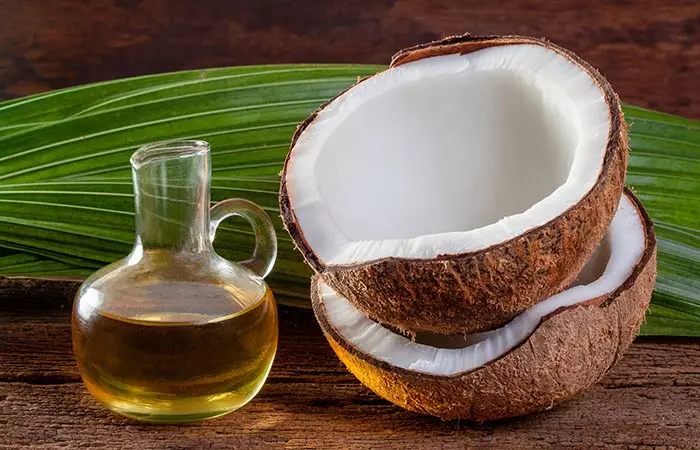
You Will Need
1 tablespoon of virgin coconut oil
What You Have To Do
- Swish virgin coconut oil in your mouth for 10-15 minutes.
- Spit the oil out.
- Brush and floss your teeth as usual.
How Often You Should Do This
Do this once daily, preferably every morning.
Why This Works
Oil pulling with coconut oil may be beneficial in getting rid of oral microbes due to its anti-H. pylori effects (11).
11. Lemongrass Oil

You Will Need
- 2-3 drops of lemongrass oil
- 1 tablespoon of coconut oil
What You Have To Do
1. Add two to three drops of lemongrass oil to a tablespoon of coconut oil.
2. Mix well and apply it to your stomach.
3. Leave it on for 20-30 minutes and rinse it off.
4. You can also add a drop of lemongrass oil to a diffuser filled with water and inhale the diffused fragrance.
How Often You Should Do This
You can follow this herbal remedy 1-2 times daily.
Why This Works
Lemongrass essential oil possesses bactericidal properties against H. pylori (12).
The above remedies are best used in combination with prescription medications to treat H. pylori infections. Consult your doctor before going ahead with any of them to make sure that they do not interfere with your prescription drugs. Also, before you use essential oils, talk to consult with your doctor for the correct dosage. Application of non-recommended doses of essential oils may result in functional damage to the stomach and liver (13). Other alternative medications to consider are acupuncture, ayurveda, homeopathy, naturopathy, and traditional Chinese medicine.
Knowing the clinical recommendations for H. pylori management is important for those looking for both natural and conventional therapy options to ensure a safe and successful recovery. Scroll down to learn more.
Clinical Guidelines For H. pylori Treatment
Conventional methods of treating H. pylori infections usually involve a combination of proton pump inhibitors (PPIs) and antibiotics. The PPIs help lower stomach acid, permitting the repairing of the stomach lining and increasing the effectiveness of the antibiotics to eliminate the bacteria. The treatment typically lasts about two weeks to guarantee complete elimination and lower the chance of recurrence.
In addition to following these remedies, you also need to pay attention to what you eat to deal with H. pylori infections.
Healthy Diet For H. pylori Infections
Foods rich in antioxidants are especially helpful in treating H. pylori infections by activating your immunity (14). They include foods rich in vitamin C like berries, bell peppers, spinach, and kale.
Citrus fruits also exhibit bactericidal effects against H. pylori, both alone as well as in combination with other antibiotics (15).
Broccoli sprouts are rich in a compound called sulforaphane, which is believed to exhibit anti-H. pylori activities (16). The fatty acids in olive oil may also help with an H. pylori infection (5).
Certain foods can also worsen the symptoms of your infection. So, what not to eat when you have an H. pylori infection?
Foods that may further worsen your condition and are best avoided include alcohol, spicy foods, carbonated drinks, fried/fatty foods, chocolate, coffee, and acidic foods. It is important to incorporate a few lifestyle modifications and dietary changes. Acid reflux, which is a common symptom associated with an H. pylori infection, may also worsen with the consumption of these foods (17).
The aforementioned foods can help manage an H. pylori infection better. But is that infection contagious? Learn more in the next section.
Is H. pylori Contagious?
H. pylori
primarily infects the stomach lining and causes gastric ulcers and chronic gastritis. This makes it contagious, as it spreads through oral-to-oral or fecal-to-oral routes, typically through contaminated food, water, or close personal contact (18). The risk of transmission within families or close contacts is especially higher due to shared living spaces and common sources of infection.
However, it is not highly infectious like the common cold or flu. Not everyone exposed to H. pylori develops an infection. Some may remain asymptomatic for a long time. These infections mostly occur in childhood, and, if left untreated, often persist into adulthood. Therefore, practice frequent handwashing and avoid sharing utensils to minimize the risk of transmission.
How To Prevent H. pylori Infections
- Wash your hands every time you use the loo and before eating.
- Wash your hands before cooking meals.
- Avoid food/water that is contaminated.
- Avoid consuming foods that are not cooked thoroughly.
- Quit smoking.
- Quit drinking alcohol.
- Follow good hygiene practices.
- Avoid close contact with affected individuals.
- Avoid sharing utensils with affected individuals.
When managing gastritis due to infection, it is crucial to follow a well-balanced gastritis diet. Knowing which foods to avoid and foods to consume can significantly impact your comfort and recovery. In addition to dietary adjustments, effective home remedies for gastritis can provide relief from symptoms.
You can easily avoid H. pylori infections if you maintain basic hygiene. As this infection can spread rapidly, you need to be cautious when you are in a developing country or in close contact with an affected individual.
Some individuals may not even realize that they are harboring H. pylori as the symptoms are not always evident. In such cases, the infection is not problematic. However, if you are diagnosed with H. pylori infection, it is best to get it treated medically to prevent complications from the disease.
Did you find this post helpful? Let us know in the comments box below.
Infographic: 5 Natural Ways To Treat Helicobacter Pylori Infection
Helicobacter pylori infection requires prompt medical treatment. Though it is best to take prescription medicines, you can also use simple ingredients from your pantry to ease the symptoms. We have rounded up 5 natural remedies that may help in treating this infection. Check the infographic below to know more.
Some thing wrong with infographic shortcode. please verify shortcode syntax
Helicobacter pylori is a common type of bacteria that infects the stomach lining. This infection can spread quickly, and people with H. pylori infection may experience stomach ulcers, nausea, bloating, burping, and vomiting. However, there are some natural treatments for Helicobacter pylori infections. Consuming probiotics, green tea, honey, olive oil, aloe vera, and licorice root may help treat these infections. In addition, maintaining good hygiene, avoiding the intake of contaminated food or water, and quitting drinking and smoking may help manage and prevent these infections. But if you still experience the symptoms despite using the home remedies, immediately consult your doctor.
Frequently Asked Questions
Can a blood test detect H. pylori?
Yes. Dr. Jesse P Houghton, MD, Gastroenterologist, says, “The blood test detects the antibody in the bacteria. However, the blood test should not be used to check for eradication of the bacteria after treatment as the antibody will stay positive for years after successful treatment.”
Can endoscopy detect H. pylori?
Yes. Dr. Houghton adds, “Biopsies of the stomach lining are a reliable source of detection.”
Can apple cider vinegar get rid of H. pylori?
Yes, studies indicate that vinegar may inhibit the movement of H.pylori bacteria and provide relief from H. pylori infection (19).
Is egg good for H. pylori?
Yes, consumption of egg yolk may help reduce H.pylori-inducedi Diseases caused by an infection due to the bacteria Helicobacter Pylori, which are usually common in children. gastric injury and overall infection (20).
Illustration: Home Remedies To Get Rid Of Helicobacter Pylori Infection

Image: Stable Diffusion/StyleCraze Design Team
Discover how to use natural ingredients to help treat H. pylori infection. Watch this video to learn about 6 simple remedies that can help reduce the symptoms and provide relief.
Personal Experience: Source
StyleCraze's articles are interwoven with authentic personal narratives that provide depth and resonance to our content. Below are the sources of the personal accounts referenced in this article.
i. My storyhttps://hpylorisucks.wordpress.com/my-story-2/
References
Articles on StyleCraze are backed by verified information from peer-reviewed and academic research papers, reputed organizations, research institutions, and medical associations to ensure accuracy and relevance. Read our editorial policy to learn more.
- “Current understanding and management of Helicobacter pylori infection: an updated appraisal” F1000 Research, US National Library of Medicine.
- “Are probiotics useful in Helicobacter pylori eradication?” World Journal Of Gastroenterology, US National Library of Medicine.
- “Green tea inhibits Helicobacter growth in vivo and in vitro” International Journal Of Antimicrobial Agents, US National Library of Medicine.
- “The Antibacterial Activity of Honey on Helicobacter Pylori” Sultan Qaboos University Medical Journal, US National Library of Medicine.
- “In vitro activity of olive oil polyphenols against Helicobacter pylori.” Journal of Agricultural and Food Chemistry, US National Library of Medicine.
- “In vitro activity of Aloe vera inner gel against Helicobacter pylori strains.” Letters in Applied Microbiology, US National Library of Medicine.
- “The healing effect of licorice (Glycyrrhiza glabra) on Helicobacter pylori infected peptic ulcers” Journal of Research in Medical Sciences, US National Library of Medicine.
- “Combination of Nigella sativa and Honey in Eradication of Gastric Helicobacter pylori Infection” Iranian Red Crescent Medical Journal, US National Library of Medicine.
- “Effects of curcumin on Helicobacter pylori infection” Annals of Translational Medicine, US National Library of Medicine.
- “Ginger (Zingiber officinale Roscoe) and the Gingerols Inhibit the Growth of Cag A+ Strains of Helicobacter pylori” Anticancer Research, US National Library of Medicine.
- “Oil pulling and importance of traditional medicine in oral health maintenance” International Journal of Health Sciences, US National Library of Medicine.
- “Antimicrobial activity of essential oils against Helicobacter pylori.” Helicobacter, US National Library of Medicine.
- “Toxicological Evaluation of Essential Oils from Some Plants of Rutaceae Family” Evidence-based Complementary and Alternative Medicine, US National Library of Medicine.
- “Effect of antioxidants on the immune response of Helicobacter pylori.” Clinical Microbiology and Infection, US National Library of Medicine.
- “Effectiveness of Citrus Fruits on Helicobacter pylori” Evidence-Based Complementary and Alternative Medicine, US National Library of Medicine.
- “Oral broccoli sprouts for the treatment of Helicobacter pylori infection: a preliminary report.” Digestive Diseases and Sciences, US National Library of Medicine.
- “Food and Gastroesophageal Reflux Disease” Current Medicinal Chemistry, US National Library of Medicine.
- “Helicobacter pylori, transmission routes and recurrence of infection: state of the art” Acta Biomedica, US National Library of Medicine
- “An Alternative Approach for the Rising Challenge of Hypertensive Illness via Helicobacter pylori Eradication” Cardiology Research, US National Library of Medicine
- “Use of Egg Yolk-Derived Immunoglobulin as an Alternative to Antibiotic Treatment for Control of Helicobacter pylori Infection” Clinical Vaccine and Immunology, US National Library of Medicine
Read full bio of Dr. Millie Lytle
- Dr. Jesse P. Houghton, MD, FACG, is a gastroenterologist with over two decades of experience in internal medicine and gastroenterology. He has been practicing at Southern Ohio Medical Center as the Senior Medical Director of Gastroenterology since 2012. He is also an Adjunct Clinical Associate Professor of Medicine at the Ohio University School of Osteopathic Medicine.
 Dr. Jesse P. Houghton, MD, FACG, is a gastroenterologist with over two decades of experience in internal medicine and gastroenterology. He has been practicing at Southern Ohio Medical Center as the Senior Medical Director of Gastroenterology since 2012. He is also an Adjunct Clinical Associate Professor of Medicine at the Ohio University School of Osteopathic Medicine.
Dr. Jesse P. Houghton, MD, FACG, is a gastroenterologist with over two decades of experience in internal medicine and gastroenterology. He has been practicing at Southern Ohio Medical Center as the Senior Medical Director of Gastroenterology since 2012. He is also an Adjunct Clinical Associate Professor of Medicine at the Ohio University School of Osteopathic Medicine.
Read full bio of Shaheen Naser
Read full bio of Arshiya Syeda
Read full bio of Dipti Sharma



























Community Experiences
Join the conversation and become a part of our empowering community! Share your stories, experiences, and insights to connect with other beauty, lifestyle, and health enthusiasts.